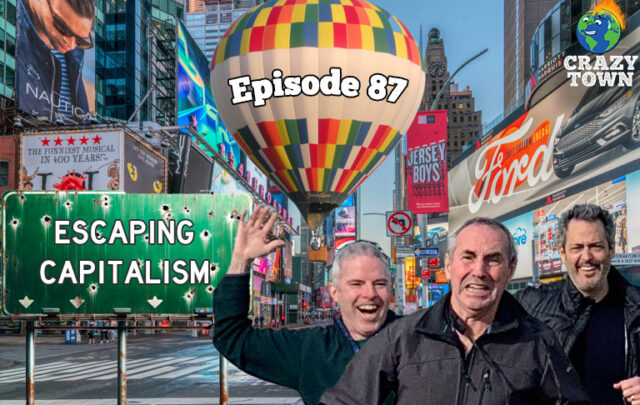Marcin Gerwin: It was predicted in the 1930 by the economist John Maynard Keynes that thanks to the technological innovations, people in the twenty-first century will not have to work more than 15 hours a week. But here we are in the twenty-first century and many people in the industrialized world are in a hurry all the time and they have very little free time left. In Poland people usually work 40 hours per week and they often come home exhausted. Perhaps a shorter working time would be a good idea?
Anna Coote: Yes, that is a good idea. We suggest about 30 hours per week and we think it is achievable.
MG: What are the potential benefits?
 AC: When people have more free time they spend it on things that are valuable for the society as a whole. This includes caring for children and their elderly relatives. Too much emphasis is put on the need to keep on working for money. There are all sorts of work that isn’t a part of the paid working week. And it should be valued and recognized. It would also unlock the entrenched gender inequalities we have and it would make a much easier transition to retirement. Instead of people working 40 plus hours and then not working at all (a ‘sudden drop’ which is bad for your health anyway), you have a more gradual transition.
AC: When people have more free time they spend it on things that are valuable for the society as a whole. This includes caring for children and their elderly relatives. Too much emphasis is put on the need to keep on working for money. There are all sorts of work that isn’t a part of the paid working week. And it should be valued and recognized. It would also unlock the entrenched gender inequalities we have and it would make a much easier transition to retirement. Instead of people working 40 plus hours and then not working at all (a ‘sudden drop’ which is bad for your health anyway), you have a more gradual transition.
MG: 30 hours of work per week may seem as a quite a big change.
AC: We don’t suggest this is something that happens immediately; there should be a gradual transition toward a shorter working week. It should be done initially on a voluntary basis, so that people are encouraged to change their attitudes to what really matters. There are also very strong environmental reasons, because it gives people more time to live a lot more sustainably. There are many things that are energy-intensive that we do for convenience, like taking a car instead of walking or buying fast food. We do it because we are busy all the time. That of course is bad for the ecological footprint. It would be also good for the economy, because in times of recession a lot of people are out of work and if you could spread the work around more fairly then you would have fewer people unemployed. It’s about making more jobs available to more people.
The main objection that people raise is that many people can’t afford to work shorter hours, because they can’t earn enough to live on. But that’s a problem of low pay, not just the hours of work. We should be thinking about how you can move towards the higher hourly rates of pay rather than just keeping everyone working 40 plus hours per week.
MG: The argument given by some economists against raising minimal pay is that it would hurt the economy.
AC: It’s about competition, isn’t it? But what are we competing for? Do we want to become the country that causes the most damage to the natural environment? Are we interested in doing better than other countries so they can be poor and we can be rich? I think we have to rethink the whole notion of competition, actually. It’s a very shallow argument.
There is also evidence, that people who work shorter hours are more productive hour for hour. They tend also to be more committed to their workplace, they can better develop their skills and balance their lives so that they are happier. Their work has better value.
MG: OK, but some economists may argue that you have to compete on the global market. If your products are more expensive, because in another country one can produce them cheaper, you will lose customers.
AC: And that’s what life is about? We’ve been accepting these arguments for far too long. That’s why the economy is in a terrible state – we have widening inequalities, we have prospects of catastrophic levels of greenhouse gas emissions and climate change, so that there will be no future for any of us if we are not careful. So we have to really radically question these assumptions we’ve been making for a long time – that the only thing that matters is to ‘pile them high and buy them cheap’. Can we sell goods that are cheaper than the Chinese? Look what China is doing to its natural environment.
We can get ahead of the game by thinking how we can live sustainably, how we can safeguard the natural environment, how we can create jobs that improve people’s wellbeing, how we can improve the quality of life and overall capabilities of the workforce. And that’s not to do with people working themselves into the ground with long hours or striving to bring down the price of every product that you make. There are some countries in Europe that have much shorter working hours on average than say the UK or the United States and their economies are more successful. So there is no correlation between a successful economy and the average length of the paid working week.
MG: How do you think we could get to the shorter working time?
AC: Thinking about how we make things and what we value and what we really need to live a good life is certainly worth considering. And do we need all the cheap goods that are imported from overseas in order to live a good life? That’s a question worth asking. What can you make yourself? What do we really value – what makes life worth living? If we had more time we would probably spend more time repairing things instead of just chucking them out when they break. I think in Poland there are more recent memories of times when things were repaired.
MG: Well, yes, but if you do that now, some people may consider it old-fashioned. It’s not what is commonly considered as appropriate for modern times.
AC: I think that’s kind of tragic. Every society has to go through the learning process. I can see why there is a reaction in the former Soviet block against seeking alternatives to a full-blooded capitalist economic system. There are people who are suspicious of it. On the other hand there is a very strong urge among people in Western countries to turn away from this sort of mindless consumerism. Do we really want to go on working long hours so that we can earn more money and spend it on a lot of goods that we don’t need? And we are spending money on goods the manufacture of which is ruining the natural environment and is jeopardizing the future of future generations.
MG: But for some people buying an expensive car, for example, is important to improve their status in a society.
AC: Yes, you’re absolutely right. This is what people say. But again, don’t you think it is a time to reconsider that? Is it the big car, the big house and all the consumer goods that make you live a good life and be a worthwhile person? When you ask people about what really matters to them they will almost always say it’s their relationships with their children, with their family, with their friends, colleagues sometimes. We keep on being told — because it is in the interest of the large corporations that are making cheap stuff they want to sell to us — that we should want to do nothing more than to keep on earning and buying. But if you ask people what they really value it’s not the latest consumer goods, it’s their relationships.
MG: Would the shorter working week benefit woman as well as men?
AC: At the moment, in spite of several decades of feminist movement that has been campaigning for equal rights and opportunities for women and men, we still find that women are stranded in lower paid, lower status jobs. The main reason for this is when women have children, it tends to be that they give up work all together or work part-time in order to care for their children. So they lose opportunities to earn more money and the man will be the one who stays in full-time employment. He is deprived of the opportunity to learn about his children, to look after them, to spend time with them, and she is deprived of the opportunity to go out to work, get training, acquire skills and earn money. It disadvantages both men and women.
But if both men and women went to a 30-hour week and gave that time to child care then men would learn how to look after their children. Often men feel they are incompetent in how to do it. In the UK women make up a huge majority of part-time workers, it is more than 90 percent I think, and even though we have equal pay legislation there is a huge gap between women’s and men’s earnings if you are looking at the weekly rates of pay. That’s because women work shorter hours. So it’s important for both men and women to work shorter hours, so we can unlock this time factor that perpetuates inequalities.
MG: How do you think employers would react to the proposal of a shorter working time?
AC: I have come across employers who said that their workforce is much more committed and harder working because most of them are on shorter hours. I have also come across employers who said they couldn’t imagine anything worse than having to manage a part-time workforce. As it happens I manage a part-time workforce and I have every variation on my team who come to work from one to five days per week. You’ve got to get used to it, but it’s not that difficult. Employers should be given incentives to take on part-time employees. We used to have a six day working week, and now we don’t. So you can get used to it.
MG: And what is the reaction of politicians?
AC: They are not very interested at the moment. We don’t think it is a proposal for next year’s election manifesto. But there is a huge interest among the public at large and in the media. It’s something that everybody relates to. So my feeling is that politicians will come round to it eventually.
MG: But I wonder, isn’t it a good idea for these times of economic crisis — because it seems it would increase employment?
AC: Well, indeed. And that’s what happened when we had a crisis in the 1970s. There was a national three day week in Britain, when the coal miners went on strike. Everybody thought it would be terrible for the economy but actually it hardly dented productivity, certainly not as much as people expected. It was quite a successful demonstration project.
~~~~~
The interview first appeared in Dziennik Opinii in Poland.
Anna Coote is Head of Social Policy at The New Economics Foundation in the United Kingdom. A leading analyst, writer and advocate in the field of social policy, Anna was responsible for ground-breaking work on health and sustainable development as Commissioner for Health with the UK Sustainable Development Commission (2000-9).





